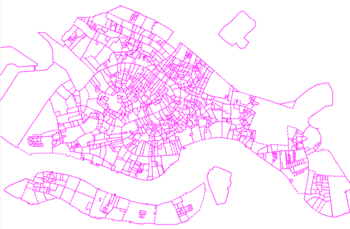Census Trends: Difference between revisions
Algorowara (talk | contribs) |
Algorowara (talk | contribs) |
||
| Line 3: | Line 3: | ||
==Scope of Census== | ==Scope of Census== | ||
So far the Venice Project Center has organized pages on data from the years [[Census 1991|1991]] and [[Census 2001|2001]]. These data have a minimum resolution unit called a [[Census tracts|census tract]], which is a semi-arbitrary subdivision - it is generally of a certain size, and does not cross the borders of any island, but it is not by definition (though it may be by choice or coincidence) a reflection of an actual physically or culturally distinct area. | So far the Venice Project Center has organized pages on data from the years [[Census 1991|1991]] and [[Census 2001|2001]]. These data have a minimum resolution unit called a [[Census tracts|census tract]], which is a semi-arbitrary subdivision - it is generally of a certain size, and does not cross the borders of any island, but it is not by definition (though it may be by choice or coincidence) a reflection of an actual physically or culturally distinct area. | ||
[[Image:91CensusTracts.PNG|thumb|center|350px| The city of Venice broken up into [[Census tracts|census tracts]] as of 1991.] | [[Image:91CensusTracts.PNG|thumb|center|350px|The city of Venice broken up into [[Census tracts|census tracts]] as of 1991.]] | ||
==Characteristics of Census Trends== | ==Characteristics of Census Trends== | ||
Overall, the [[Demographics#Population_Trends|population of Venice]] has been declining for over half a century. Additionally, the census seems to indicate that its population is growing older, which is consistent with a declining number of young people choosing to start a life in Venice, leaving the elderly behind. | Overall, the [[Demographics#Population_Trends|population of Venice]] has been declining for over half a century. Additionally, the census seems to indicate that its population is growing older, which is consistent with a declining number of young people choosing to start a life in Venice, leaving the elderly behind. | ||
Revision as of 19:49, 18 October 2013
As part of the Venice Project Center, we are interested in tracking trends in the population of Venice to better discern the demographic dynamics of the city, and how we and others are affecting them. Thankfully, the Istituto nazionale di statistica (ISTAT) conducts a census every ten years, allowing us to compare data gathered at consistent intervals using a time-tested and well-funded methodology.
Scope of Census
So far the Venice Project Center has organized pages on data from the years 1991 and 2001. These data have a minimum resolution unit called a census tract, which is a semi-arbitrary subdivision - it is generally of a certain size, and does not cross the borders of any island, but it is not by definition (though it may be by choice or coincidence) a reflection of an actual physically or culturally distinct area.

Characteristics of Census Trends
Overall, the population of Venice has been declining for over half a century. Additionally, the census seems to indicate that its population is growing older, which is consistent with a declining number of young people choosing to start a life in Venice, leaving the elderly behind.